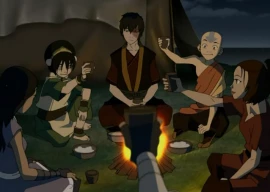1695283483-0/mahiraraziareviewsajeer-(1)1695283483-0.png)
Breath of fresh air: Mahira's 'Razia' shines with bold, unapologetic tackling of patriarchal norms
Actor's television comeback is a welcome break from tired, repeating narratives
KARACHI:
The first episode of Express Entertainment's Razia is a breath of fresh air - an exhilarating break from the oft-repeated themes and tropes that have inundated television screens, cluttering airtime and minds alike. Like a self-aware, fourth-wall-breaking narrator, Mahira Khan not only highlights but also applauds this difference within the confines of the show, setting the tone for a delightfully wacky and intriguingly immersive experience.
Dressed differently in casual, laid-back attire, with a white kameez alongside sneakers to match and a waistcoat that definitely adds dimension to the wonderful uniqueness of the character, Mahira is seen in a welcoming new avatar. The vibe is a mix between being funky and vagabondish, and her overall conversational demeanour saves one from the often unavoidable pitfall of becoming a preachy bridge between the audience and the content of the show.
Furthermore, straight off the bat, Mahira's storyteller does not shy away from tackling hazardous norms that have tainted the fabric of society. She begins by addressing the harassment of women, and, in a stroke of sheer irony when a man catcalls her from the audience, she does not hesitate to weaponize choice diction to get him to stop thinking from between his legs.
The narrative itself, which focuses on the birth and, one can assume, the life of Razia, begins in 1997. Wonderfully shot, the transportive power of the show takes us to a troubled Saleem (Mohib Mirza) leaning against the wall of a downtrodden hospital's operation theatre, wherein his wife (Momal Sheikh) is undergoing labour. The core conflict is made abundantly evident when Saleem is informed that he may have to choose between saving his wife or child.
To this, his only query is if the child is a boy, and his only request is to save the life of the male child, should such a situation arise. At their home, Saleem's mother is anticipating positive news in the form of the birth of a grandson, only for a phone call to break the news of the birth of a daughter, leading to sombre music in the background illuminating the disappointment of the crestfallen faces on-screen.
Mahira's storyteller interjects here to bravely question, "What have you achieved that you want a male child to continue your legacy?" She highlights the hypocrisy and lack of empathy on the part of those involved and complicit, including the mothers-in-law who have tackled the traumas associated with childbirth and rearing, only to subject their daughters-in-law to the same, turning them into child-producing "machines" in a relentless pursuit of a male child.
In a goosebumps-inducing moment, Mahira drives home the point that wherein the age of illiteracy, female infanticide was a rampant practice, in today's day and age, a girl is kept alive, only to be buried every step of the way. The declaration is heavy with the implication that the cross women bear is unlike any other; a weight they must carry from birth to death, as it burrows them deeper into the soil on which they tread.
The very same is illustrated when Saleem's mother bemoans the birth of his daughter, Razia. She informs him of the age-old patriarchal belief that treats a son as a "father's arm" but writes off a daughter as a "burden on a father's back." The irony is, of course, that had the daughter never been born, there would be no way for that celebrated pillar of strength to exist, in the first place.
The conversation shines a spotlight on how sons are seen as investments and daughters as an expense through the lens of man-made societal guidelines. The dispensable nature of a woman's life is also made evident when Saleem's mother asks him to begin trying for a son again, despite his wife having been in a life-or-death situation.
Brilliantly shot and conceived, Razia's innocent gargling is juxtaposed with Mahira's voiceover that highlights how the harmless child's mere existence doubles as an axe looming over her mother's head, with the threat of divorce glistening at its sharp tip. Another artful parallel that is drawn is between the superstitious beliefs that are set in motion to facilitate the birth of a son, in tandem with the negation of a doctor's warning to Saleem to wait for a while before trying for another child.
It is also worth noting that Mahira's monologue is interrupted by the news of the birth of Saleem's son, Ali, after a period of three years. For three years, Razia continues to play, ponder, and grow up alone, with the shame associated with her birth isolating her from her family in the process. Ali's birth brings forth a change in attitude on the family's part and an abundance of merriment, all of which was painfully missing when Razia was born.
In a moment of creative hilarity, Saleem's mother asks to hold Ali and passes away before she can do so. Backed by upbeat music, Mahira's voiceover packs a punch when she says that had the child been another girl, she would have been labelled a curse that snatched away her grandmother's life.
A heartbreaking scene follows, where Razia watches her father shower Ali with the love she never received, with an earnest look of longing etched upon her visage. This continues through the ages, with the difference in the treatment of the siblings becoming more pronounced with the passage of time. Another facet of irony is when Razia is asked not to compete with her younger brother. However, it is clear that Ali was given a seat at a table that stood impatiently in wait for his arrival, Razia's seat was never placed there, to begin with.
Towards the end of the episode, the audience is introduced to the only person in Razia's life she can call her own. Mannu lives two streets away from Razia and enters her life as a catalyst for her to fulfil her minuscule wishes. The heartbreaking part is that Mannu, a male presence, must snatch what is rightfully someone else's to carve a space for young Razia to revel in stolen moments of joy. Even her "acts of rebellion" are marked by a sense of innocence, such as asking questions, befriending Mannu, or sifting through numerous cola caps in the hopes of winning the bicycle her father refuses to purchase for her.
At the end of the first episode, Mahira sets the stage for the further unfolding events, promising a gripping tale that will combat "fragile egos" whilst experiencing many ups and downs. An amusing mix of narration and narrative, embellished beautifully by the exceptionally talented cast, Razia - just one episode in - is already gearing up to be a vital watch.
Have something to add? Share it in the comments
-(1)1730443275-0/Copy-of-Untitled-(60)-(1)1730443275-0-270x192.webp)

1730095495-1/WhatsApp-Image-2024-10-28-at-11-04-18-(1)1730095495-1-270x192.webp)












COMMENTS
Comments are moderated and generally will be posted if they are on-topic and not abusive.
For more information, please see our Comments FAQ